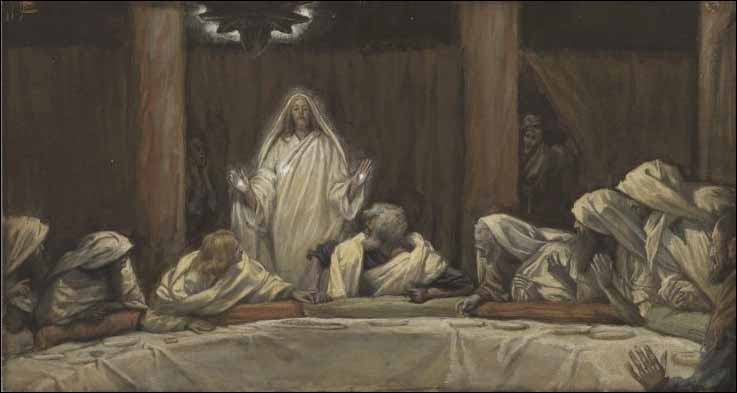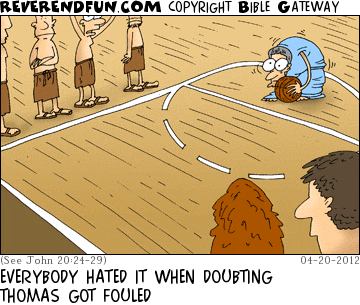Worship Helps for Easter 2
The Appearance of Christ in the Upper Room
James Tissot
Worship Theme: Our faith is based on firmest possible
ground: Jesus, our risen Lord. We cannot see him. We cannot touch him. We have
not yet experienced the joy that will be ours forever. We come to know and
trust in him as our Savior only through the precious Gospel that is revealed to
us in the words of Scripture.
First Lesson: Acts 26:19–29
19“Therefore, King Agrippa, I was not
disobedient to the vision from heaven. 20Rather, I first told those
in Damascus and Jerusalem about it, and then throughout the entire country of
Judea and also the Gentiles. I told them that they should repent and turn to
God, while also doing works that are consistent with repentance. 21These
are the reasons the Jews seized me in the temple and tried to kill me.
22“But I have had help from God right
up to this day, and so I stand testifying to both small and great. I am saying
nothing other than what the prophets and Moses said would happen, 23that
the Christ would suffer and, as the first to rise from the dead, he would
proclaim light to our people and to the Gentiles.”
24While Paul was saying these things
in his defense, Festus shouted, “Paul, you are out of your mind! Your great
learning is driving you insane.”
25But Paul replied, “I am not insane,
most excellent Festus, but I am clearly speaking words that are true and sensible.
26Certainly the king to whom I am freely speaking knows about these
things. Indeed, I cannot believe that any of these things has escaped his
notice, because this has not been done in a corner. 27King Agrippa,
do you believe the prophets? I know that you believe.”
28Then Agrippa said to Paul, “In such
a short time are you going to persuade me to become a Christian?”
29Paul replied, “I pray God, that
whether in a short time or a long time, not only you, but also all those who
are listening to me today would become what I am, except for these chains.”
1. Before which two rulers was Paul testifying?
2. In what two ways did Paul describe his teaching about
the resurrection, after Festus told Paul
that he was insane?
3. Isn’t the resurrection of all believers unreasonable?
Explain.
Second Lesson: 1 Corinthians 15:12–22
12Now if it is preached that Christ
has been raised from the dead, how is it that some among you say that there is
no resurrection of the dead? 13If there is no resurrection of the
dead, not even Christ has been raised. 14And if Christ has not been
raised, our preaching is pointless, and your faith is pointless too. 15Then
we are even guilty of giving false testimony about God, because we testified
about God that he raised Christ, whom he did not raise, if it were true that
the dead are not raised. 16For if the dead are not raised, not even
Christ has been raised. 17And if Christ has not been raised, your
faith is futile; you are still in your sins. 18Then it also follows
that those who fell asleep in Christ perished. 19If our hope in
Christ applies only to this life, we are the most pitiful people of all.
20But in fact Christ has been raised
from the dead, the firstfruits of those who have fallen asleep. 21For
since death came by a man, the resurrection of the dead also is going to come
by a man. 22For as in Adam they all die, so also in Christ they all
will be made alive.
4. What were some people in Corinth falsely claiming?
5. Why was that claim disastrous?
Gospel: John 20:19-31
19On the evening of that first day of
the week, the disciples were together behind locked doors because of their fear
of the Jews. Jesus came, stood among them, and said to them, “Peace be with
you!” 20After he said this, he showed them his hands and side. So
the disciples rejoiced when they saw the Lord.
21Jesus said to them again, “Peace be
with you! Just as the Father has sent me, I am also sending you.” 22After
saying this, he breathed on them and said, “Receive the Holy Spirit. 23Whenever
you forgive people’s sins, they are forgiven. Whenever you do not forgive them,
they are not forgiven.”
24But Thomas, one of the Twelve, the
one called the Twin, was not with them when Jesus came. 25So the
other disciples kept telling him, “We have seen the Lord!”
But he said to them, “Unless I see the
nail marks in his hands, and put my finger into the mark of the nails, and put
my hand into his side, I will never believe.”
26After eight days, his disciples
were inside again, and Thomas was with them. Though the doors were locked,
Jesus came and stood among them. “Peace be with you,” he said. 27Then
he said to Thomas, “Put your finger here and look at my hands. Take your hand
and put it into my side. Do not continue to doubt, but believe.”
28Thomas answered him, “My Lord and my God!”
29Jesus said to him, “Because you
have seen me, you have believed. Blessed are those who have not seen and yet
have believed.”
30Jesus, in the presence of his
disciples, did many other miraculous signs that are not written in this book. 31But
these are written that you may believe that Jesus is the Christ, the Son of
God, and that by believing you may have life in his name.
6. Why are Jesus’ words in verse 29 so important for us as
Christians today?
7. Why did John write the words of his Gospel?
Answers:
1. Paul was testifying before Agrippa and Festus.
2. Paul said his teaching was “true and reasonable.”
3. The resurrection of all believers on the last day might
seem unreasonable (how can a dead person come back alive, bodily?). Still, if
a) God is all-powerful, if b) Jesus rose from the dead, and if c) Jesus
promises to raise us, too, we would be “insane” not to believe in our bodily
resurrection.
4. Some in Corinth were falsely claiming that there was no
resurrection, and there will be none on the last day, either.
5. That claim was disastrous because if there is no
resurrection, then Christ was not raised from the dead, either. And if Christ
has not been raised from the dead, a) the apostles' preaching about Christ was
useless, and b) so is our trust in Christ.
6. Jesus’ words are so important for us because, unlike
those first disciples, we did not have the opportunity to see Jesus in the
flesh and witness his saving work. Even though we have not seen him, we have
God’s promise that we will receive the same blessing of eternal life through
trusting in him.
7. John did not record every last detail of Jesus’ life in
his Gospel. He wrote what he wrote so that we might believe that Jesus is the
Son of God and Savior of the world. Through faith in Jesus we, as those first
disciples, will receive God’s eternal blessings in glory.
Can you feel the joy? The disciples and Thomas felt the
joy of the resurrection. They were overjoyed. With the eyes of faith, we too
see the Lord every time he comes to us through his Word and sacrament. May this
joy fill your hearts as you eagerly serve our risen Lord!
The Church Fathers have clearly handed down the doctrine
that we need mercy even in good works.
Scripture teaches the same. “Enter not into judgment with Your servant,
for no one living is righteous before You” (Psalm 143:2). This passage denies absolutely—even to all
saints and servants of God—the glory of righteousness, if God does not forgive,
but judges and convicts their hearts.
For when David boasts about his righteousness, he speaks about his own
cause against the persecutors of God’s Word.
He does not speak of his personal purity. He asks that God’s cause and glory be
defended, “Judge me, O Lord, according to my righteousness and according to the
integrity that is in me” (Psalm 7:8)
Likewise, in Psalm 130:3, he says that no one can endure God’s judgment:
“If You, O Lord, should mark iniquities,
O Lord,
who could stand?”
If I wash myself with snow and cleanse my hands with lye,
yet You will plunge me into a pit. (Job 9:30–31)
Who can say, “I have made my heart pure;
I am
clean from my sin”? (Proverbs 20:9)
If we say we have no sin, we deceive ourselves,
and the
truth is not in us. (1 John 1:8)
In the
Lord’s Prayer the saints ask for the forgiveness of sins. Even the saints have sins. – Apology of
the Augsburg Confession, Article V, Love and Fulfilling the Law (paragraphs 204-208)
O sons and daughters of the King,
Whom heav'nly hosts in glory sing,
Today the grave has lost its sting!
Alleluia! Alleluia! Alleluia!
On that first morning of the week,
Before the day began to break,
The Marys went their Lord to seek.
Alleluia! Alleluia! Alleluia!
An angel bade their sorrow flee,
For thus he spoke unto the three,
"Your Lord will go to Galilee."
Alleluia! Alleluia! Alleluia!
That night th' apostles met in fear;
Among them came their Lord most dear
And said: "Peace be unto you here."
Alleluia! Alleluia! Alleluia!
When Thomas afterwards had heard
That Jesus had fulfilled his word,
He doubted if it were the Lord.
Alleluia! Alleluia! Alleluia!
"Thomas, behold my side," said he,
"My hands, my feet, my body see;
And doubt not, but believe in me."
Alleluia! Alleluia! Alleluia!
No longer Thomas then denied;
He saw the feet, the hands, the side;
"You are my Lord and God," he cried.
Alleluia! Alleluia! Alleluia!
Blessed are they that have not seen
And yet whose faith has constant been;
In life eternal they shall reign.
Alleluia! Alleluia! Alleluia!
On this most holy day of days
To God your hearts and voices raise
In laud and jubilee and praise.
Alleluia! Alleluia! Alleluia!



Comments
Post a Comment